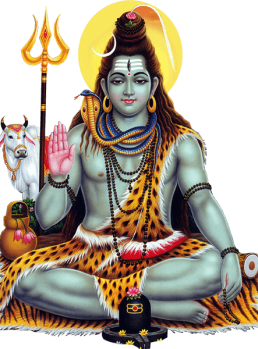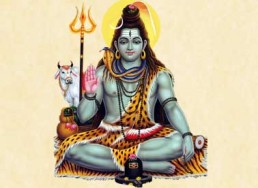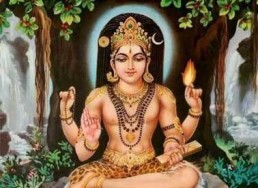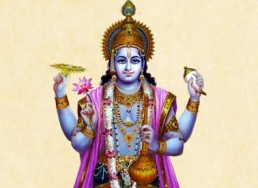Tatpurushaya Vidmahe
तन्नो रुद्रः प्रचोदयात्॥
tanno rudraḥ pracodayāt..
(or)
Om. May we know that Lord Isvara, for which may we meditate upon Mahadeva. May that Rudra endow our minds with lustre and clarity, may he make all our thoughts brilliant or effulgent.

Description
Lord Rudra is a famous deity worshipped popularly in Hinduism since Vedic times. Rudra is the manifestation of Lord Shiva and quite often the term Shiva and Rudra are used interchangeably. Rudra is the destructive and cleansing force. Though the name looks fierce, Lord Rudra is highly merciful and benevolent in fulfilling the needs of the devotees.
Gayatri mantras are protective in nature. They act like a shield surrounding the individual and protect them from all fears and dangers. The Rudra or Shiva Gayatri mantra says “I meditate on the Supreme Being of Lord Maha Deva. Let Lord Rudra illumine my intellect and show a clear path to enlightenment.”
Benefits of chanting Rudra mantras
Rudra mantras remove fear and clear all the confusions and vagaries of the mind. Every human has a set of fears. Chanting Rudra mantra regularly in the prescribed manner with devotion and focus of mind can help overcome all kinds of fears and stresses.
Rudra mantra is the ultimate panacea for all illnesses, discomforts and diseases. It can relieve the individual of the uncomfortable state of illnesses and promote overall health and happiness.
When you feel your energies are drained, you can chant Rudra mantra to recharge your body, mind and spirit. Rudra mantra can relieve the harmful influences of planets and bring peace and stability into the individual’s life. It can augment the positive planetary influences and offset the negative impacts of some unfavourable planetary combinations.
Detailed meaning from the book Prayer Guide by Swami Dayananda
Rudra is the one who is known through the sāstras or Vedas. The word ‘Rudra’ means the one who destroys samsāra or ajñāna, ignorance. The other meaning is the one into whom the whole world is resolved. When the Lord absorbs into himself everything that is projected, he is Rudra. That is why you will see Lord Siva sitting in meditation. Everything is absorbed into him; the whole world of time and space collapses into him. The limitless conscious being, saccidānanda-vastu, who is Isvara as the one who brings into manifestation, sustains and resolves the world, srsti-sthiti-laya-kartr, is called Rudra, in the function of resolving. He is the one whose grace is invoked for the removal of ignorance. This Rudra is puruşa, who is pūrņa or limitless. What kind of puruşa is he?
Tatpuruṣāya, tasmai puruṣāya which is to be taken as tam puruşam. It is told in the śāstras that Isvara, is the prathama-puruşa, the first person. In English grammar what we call the third person is the first person in Sanskrit. He is the first one and everything comes from him. We pray to know that being, puruşa, who is pūrņa, limitless, and who is revealed by the sāstra. Puruṣāya is construed as puruşam, the accusative case.
Vidmahe, may we know or come to know. The verb is in the plural. This is a gayatri-mantra. In all gayatri mantras, like this one, the verb is in the plural. Why do we say ‘we’ when it is ‘I’ who wants to know? This is because we include others in our prayer. May we know that puruşa who is limitless.
Mahadevāya dhimahi. Dhimahi means we meditate upon. We meditate upon that Lord Mahadeva who is mahān, limitless, and who is all-knowledge, devā, the Lord of all Lords and the Lord of all devatās like Indra, Varuna and so on.
Tanno rudraḥ pracodayāt: Tat, that Rudra or Mahādeva, who we want to know and upon whom we meditate, naḥ pracodayāt, may he impel us. May he set our minds in the proper direction to enable us to discover what the truth is, and what the Lord is. Here one meaning of pracodayet is, may he impel the mind on the proper course of action. We can also understand it to mean pracodanam kuryāt. Pracodana means dyotana, illumination. May he endow our minds with lustre and clarity, may he make all our thoughts brilliant or effulgent!
Other Shiva Shlokams
Aksharamalika Shiva Stotram
Also called the Shiva Akshara Mala Stotram, this is a very popular prayer addressed to Lord Shiva. Each verse starts in the order of alphabets in Sanskrit.
Anayasena Maranam
O Lord Shiva, please grant me a peaceful death without pain (Anasayena Maranam), a life without any trouble or dependence on others for my basic needs (Vina Dhainyena Jeevanam) and a life filled with
Ardha Narishvara Stotram
Shri Ardhanareeshwara Stotram was composed by Sri Adi Shankara bhagavatpada. Creator and Creation are One ~ Ardhanarishwara, composite of Shiva and Shakti together in one body.
Bhoothanath Ashtakam
The Bhoothanatha Ashtakam composed by Shri Krishnadasa is a devotional hymn that glorifies Lord Shiva in his form as Bhoothanatha, the Lord of all beings, spirits, and the cosmos.
Bilvashtakam
Composed by Sri Adi Shankaracharya, the famous Bilvashtakam extols the virtues of the Bilva leaf (also spelt Vilva, Bilwa) and Lord Shiva’s love for it. The following com
Bilvashtakam 14 Verses
Note: For the original version of Bilvashtakam please click here. Composed by Sri Adi Shankaracharya,
Chandrashekhara Ashtakam
Chandrashekhara Ashtakam is a divine hymn to praise God Shiva as Chandrasekhara, the lord who is adorned with moon on his head (Chandra – moon, Sekhar – crown) and to seek refuge from untimely death.
Dakshinamurthy Stotram
Shlokams,Sankara,Shiva,Dakshinamurthy
The Dakshinamurti Stotra is a Sanskrit religious hymn to Shiva by Sri Adi Shankaracharya. It explains the metaphysics of the universe in the frame of the tradition of Advaita V
Ishvaro Guru Atmeti
Shlokams,Shiva,Dakshinamurthy,Guru,Sankara
Salutations to Lord Dakshinamurti, who is all-pervasive like space but who appears (as though) divided as Lord, Guru, and the Self.
Kalabhairava Ashtakam
Composed by Sri Adi Shankaracharya. The hymn illustrates the personality of Kala Bhairava of Kashi, the God of Death(kala). Those who study these 8 verses on Kala Bhairava, which are enticing and whic
Karacharana Kritam
O Lord, kindly forgive all the wrong acts and omissions I have committed, whether I committed them knowingly or unknowingly, with my hands, feet, words, ears, eyes, or mind. Glory to you, Mahadeva, wh
Karpura Gauram
Pure white like camphor, an incarnation of compassion, the essence of worldly existence, whose garland is the king of serpents, always dwelling inside the lotus of the heart. I bow to Shiva and Shakti together
Kasi Viswanathashtakam
Composed by Sri Adi Sankaracharya in praise of Lord Shiva. That man who reads this octet with its meaning, which sings the praise of Shiva who is the lord of Varanasi, would get knowledge, wealth, gre
Lingashtakam
The Lingashtakam is one of the most popular Ashtakams(a Stotram with 8 verses) dedicated to Lord Shiva which praises Him in the abstract "Lingam" form.
Maha Shivaratri
Significance of Ganesh Puja, Vinayaka Chavithi or Chathurthi. See how to prepare for Ganesha Pooja, How to perform the Puja with Video instructions and enjoy Audio devotional songs, uninterrupted and without ads.
Mantra Pushpam
The Mantra Pushpam (literally translating to "Flower of Mantras") is a collection of sacred verses from the 10th chapter of Taittiriya Aranyaka of Krishna Yajur Veda. Each verse begins with an exploration of the relationship between the flower of…
Margabandhu Stotram
This great Stotra Rathna was written by Appayya Deekshitha(1520-1593). He was one of the great interpreter of Advaitha Sidhantha after Adi Sankara. This stotra is written in praise of the Lord Margaba
Mauna Vyakhya
Shlokams,Sankara,Shiva,Dakshinamurthy
I salute Sri Dakshinamurti, who is not subject to time, who makes known the truth of Brahman through the implied meaning of words, who is surrounded by disciples who are themselves Rishis and committe
Mruthyunjayaya Rudraya
Salutation to you Mrithyunjaya, Rudra, Nilakanta, Shambhu & the lord of immortals and this great lord of all beings.
Namaste astu bhagavan
Morning prayer. From Devi Mahatmyam. The Devi Mahatmyam is a Hindu religious text describing the Goddess as the supreme power and creator of the universe. It is part of the Markandeya Purana, and esti
Nidhaye Sarvavidyanam
Shlokams,Sankara,Shiva,Dakshinamurthy
Salutations to Sri Dakshinamurti, the reservoir of knowledge (the abode of all learning), the healer of all those who suffer from the disease of samsāra, and the teacher of the whole world.
Om Namah Pranavarthaya
Shlokams,Sankara,Shiva,Dakshinamurthy
Om. Salutation to the one who is the meaning of praņava, who is in the form of pure knowledge, who is taintless and who is free from any change. To that Sri Dakshinamurti, (my) salutations.
Om Namo Bhagavate Dakshinamurthaye
Shlokams,Sankara,Shiva,Dakshinamurthy
Om. Salutations to Bhagavan Dakshinamurti. (Oh Lord) Bless me with memory, the capacity to think properly, and clarity, wisdom.
Rudra Ashtakam
The famous Rudrashtakam extols the many qualities of Shiva. This is composed by Sri Goswami Tulsidas. Rudra is considered as the fearsome manifestation of Shiva. Rudrashtakam has its origins in the Ra
Rudram Chamakam
The Chamakam portion of the Sri Rudram is a profound and structured Vedic prayer that follows the Namakam, extending the worship of Lord Rudra (Shiva) by asking for blessings and the fulfillment of various needs. Unlike the Namakam, which focuses on…
Rudram Chamakam Meaning
The Chamakam portion of the Sri Rudram is a profound and structured Vedic prayer that follows the Namakam, extending the worship of Lord Rudra (Shiva) by asking for blessings and the fulfillment of various needs. Unlike the Namakam, which focuses on…
Rudram Laghunyasam
Laghunyasam is a preliminary Vedic chant traditionally recited before performing the Sri Rudram to purify and align the body, mind, and spirit with divine energy. The term "Nyasam" refers to a process of mentally assigning or dedicating various…
Rudram Laghunyasam Meaning
Laghunyasam is a preliminary Vedic chant traditionally recited before performing the Sri Rudram to purify and align the body, mind, and spirit with divine energy. The term "Nyasam" refers to a process of mentally assigning or dedicating various…
Rudram Namakam
The Namakam portion of the Sri Rudram, also known as the Rudra Prashna, is a profound and intricate Vedic hymn found in the Krishna Yajurveda, specifically within the Taittiriya Samhita (Book 4, Chapter 5). The term Namakam is derived from the…
Rudram Namakam Meaning
The Chamakam portion of the Sri Rudram is a profound and structured Vedic prayer that follows the Namakam, extending the worship of Lord Rudra (Shiva) by asking for blessings and the fulfillment of various needs. Unlike the Namakam, which focuses on…
Shambu Devam Sakalajagatam
I sing in praise of God Shambhu, the Lord of all worlds, and the three-eyed one; the consort of Gauri, the grantor of happiness, blessings and gifts, the one with the moon as his crest-jewel.
Shambu Stuti
A stuti on lord Shiva composed by lord Rama himself. Lord Rama recites this at Rameshwaram when faced with the near impossibility of crossing the vast ocean to reach Lanka, he prayed intensly to Lord
Shiva Aparadha Kshamapana Stotram
The Śiva Aparādha Kṣamāpaṇa Stotram, or "Hymn of Forgiveness for Offenses to Lord Śiva," is a heartfelt composition by the revered philosopher and saint Śrī Ādi Śaṅkarācārya. T
Shiva Ashtakam
Composed by Adi Shankaracharya. This ashtakam is a descriptive salutation of the different attributes of Shiva. The great yogi who is referred to as Ardhanarishwara (the one who has included the femin
Shiva Mahimna Stotram
The Shiva Mahimna Stotra is very popular among the devotees of Lord Shiva and is considered one of the best among all Stotras (or Stutis) offered to Lord Shiva. The legend abou
Shiva Mahimna Stotram Meaning
The Shiva Mahimna Stotra is very popular among the devotees of Lord Shiva and is considered one of the best among all Stotras (or Stutis) offered to Lord Shiva. The legend abou
Shiva Manasa Puja
Sri Adi Shankaracharya composed this mantra for lord Shiva. Using this stotra, we can perform mental worship of Lord Shiva.
Shiva Panchakshara Stotram
The famous Shiva Panchakshara Stotram praises Shiva and the power of the five sacred syllables, na-ma-shi-va-ya.
Shiva Pratah Smaranam
This is a short and beautiful 'Three Shloka Prayer' that makes the start of the day full of energy and happiness. Composed by Sri Adi Shankaracharya.
Shiva Sahasranama Stotram
Also called the Shiva Akshara Mala Stotram, this is a very popular prayer addressed to Lord Shiva. Each verse starts in the order of alphabets in Sanskrit.
Shiva Shadakshara Stotram
In this Hexa-Syllabic Hymn, there is a single stanza mantra for each letter of Aum-Na-Ma-Shi-Va-Ya. This mantra is found in Rudrayamala Tantra text.
Shiva Tandava Stotram
Shiva Tandava Stotram The Shiva Tandava Stotram is a deeply powerful and rhythmic hymn that glorifies Lord Shiva's cosmic dance, known as the Tāṇḍava. It is traditiona
Tryambakam Yajamahe
We worship Lord Shiva the three-eyed one, the one who is the master of all senses and qualities and the one who is the sustainer of all growth. May he release us from the bondage of death, just as a r
Vagarthaviva Sampruktau
Kalidasa prays to the divine parents Paarvathi & Parameshwara who are inseparable like the word and its meaning, in order to guide him in acquiring the power of words and their meanings (literature) as he embarks on the Mahakavya, Raghuvamsa.
Vande Shambu Umapatim
I salute Shambu, Umapati, the preceptor (teacher) of devas, I salute the cause of the earth, I salute the one ornamented with the serpent, the wearer of the moon, I respect that master of all beings.
Vedasara Shiva Stava
Composed by Sri Adi Shankaracharya in praise of Lord Shiva - the essence of vedas.
Tatpurushaya Vidmahe – Shiva – In Sanskrit with English Transliteration, Translation and Meaning. Commentary for selected Shlokams. With commentary by Swami Dayananda



